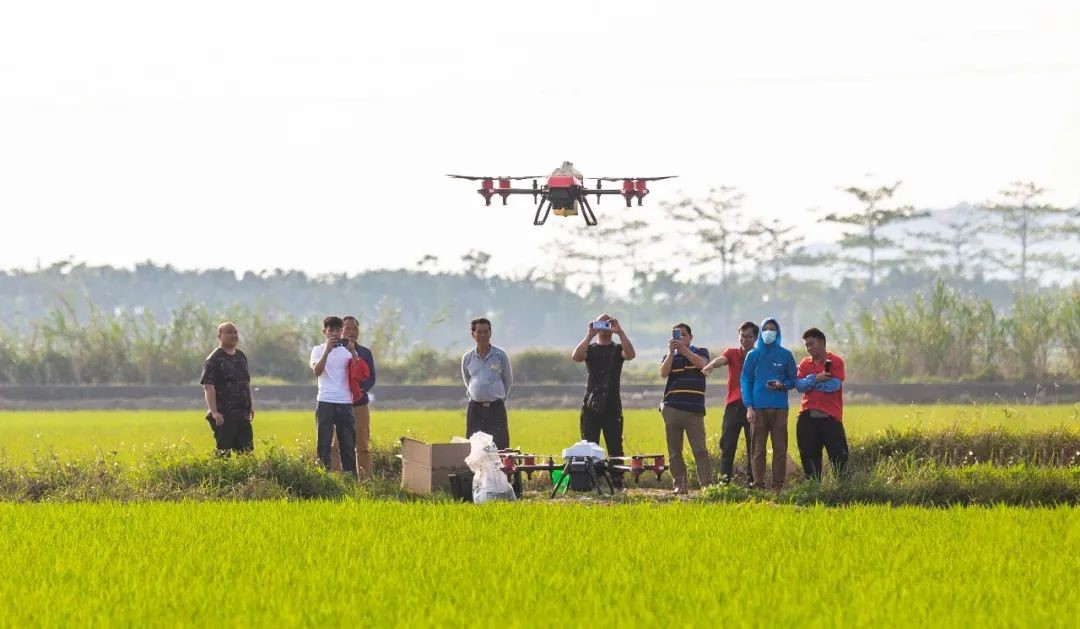Digital Agriculture and Sustainable Development Forum
On March 17, 2021, the Digital Agriculture and Sustainable Development Forum and the XAG Corporate Social Responsibility (CSR) Report Press Release were successfully held in Beijing. XAG hosted the forum, Institute for Sustainable Development Goals of Tsinghua University (TUSDG) attended the event as the academic guidance unit of the CSR report.
Focusing on the theme of "Digital Agriculture and Sustainable Development", the forum invited representatives from the United Nations agencies in China, scholars, entrepreneurs and investors to discuss and exchange views on how digital agriculture can contribute to realize the Sustainable Development Goals (SDGs).
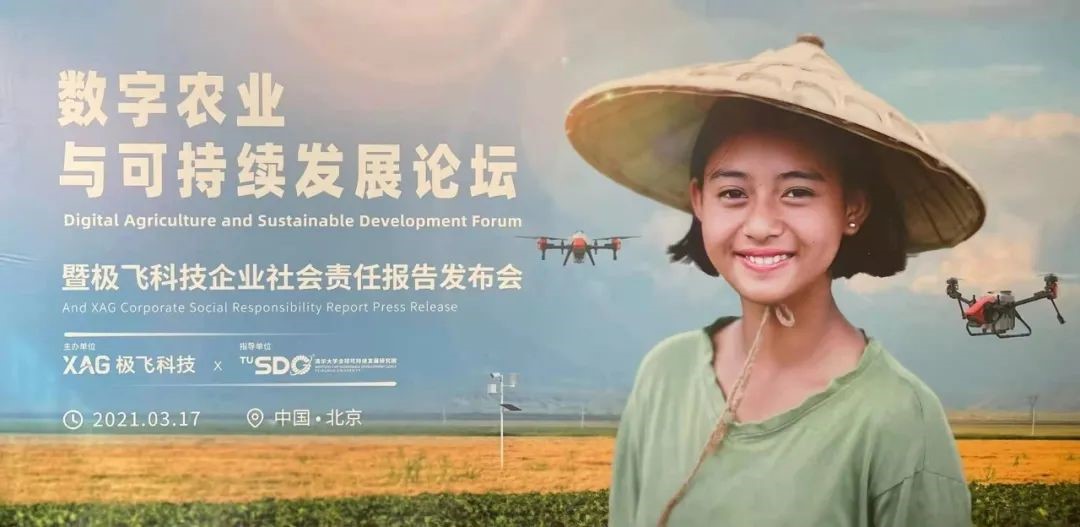
Dong Le, Poverty Reduction and Innovation Officer (China Office) of the Food and Agriculture Organization (FAO) of the United Nations, Prof. Zhu Xufeng, Executive Director of TUSDG, Yu Zhihong, President and Editor-in-Chief of China Sustainability Tribune, Mr. Peng Bin, Founder and CEO of XAG, delivered speeches respectively.
In his speech, Dong Le said that the FAO has paid great attention to innovation in the agricultural sector in recent years and actively cooperated with market players in the private sector. He introduced that the United Nations Food System Summit will be held in September this year. New actions will be taken to change the way of how the world produces and consumes food, to promote the realization of all the 17 Sustainable Development Goals (SDGs). Many of the FAO's ongoing programs, such as the "Hand in Hand" action plan, are working to bring all parties together to help farmers address their urgent needs for capital and technology. Dong Le pointed out that the FAO will pay more attention to deep cooperation with agricultural technology companies in the future to contribute to the development of digital agriculture and global poverty alleviation.
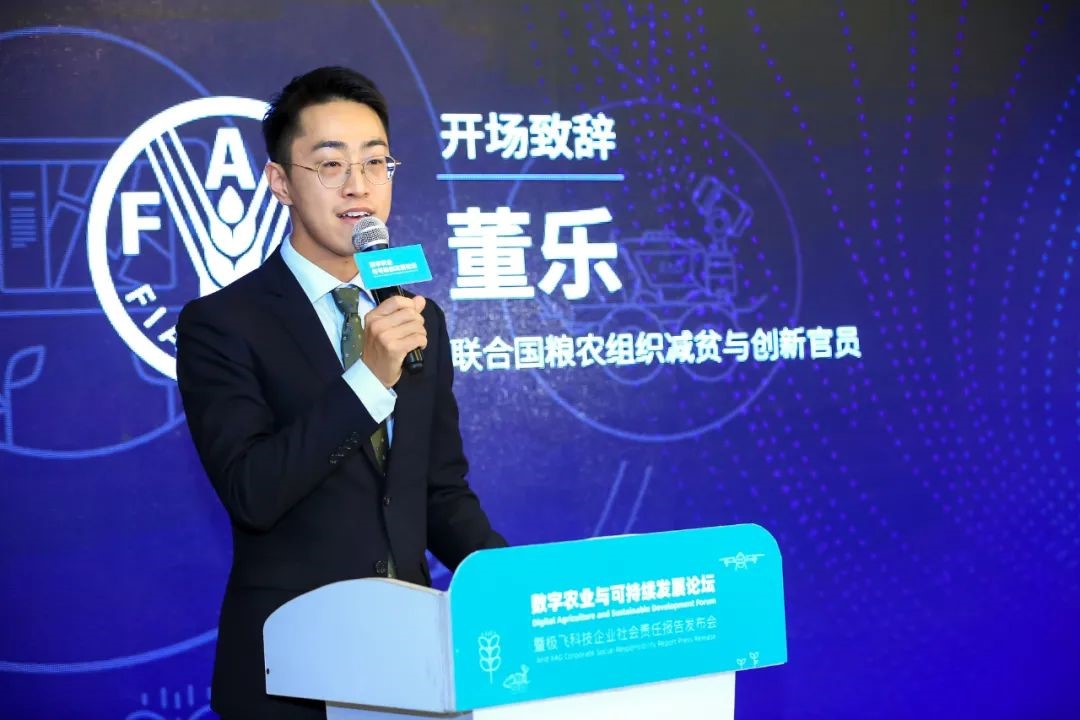
Speech by Dong Le, Poverty Reduction and Innovation Officer of FAO
Prof. Zhu Xufeng congratulated the successful release of the XAG CSR report. From the perspectives of AI empowering the traditional agricultural industry and helping rural revitalization, he pointed out that digital agriculture can bring new vitality to the growth of the national economy during the important period of strategic opportunities for the flourishing development of the digital economy, so as to contribute to the realization of the 17 SDGs of the 2030 Agenda for Sustainable Development.
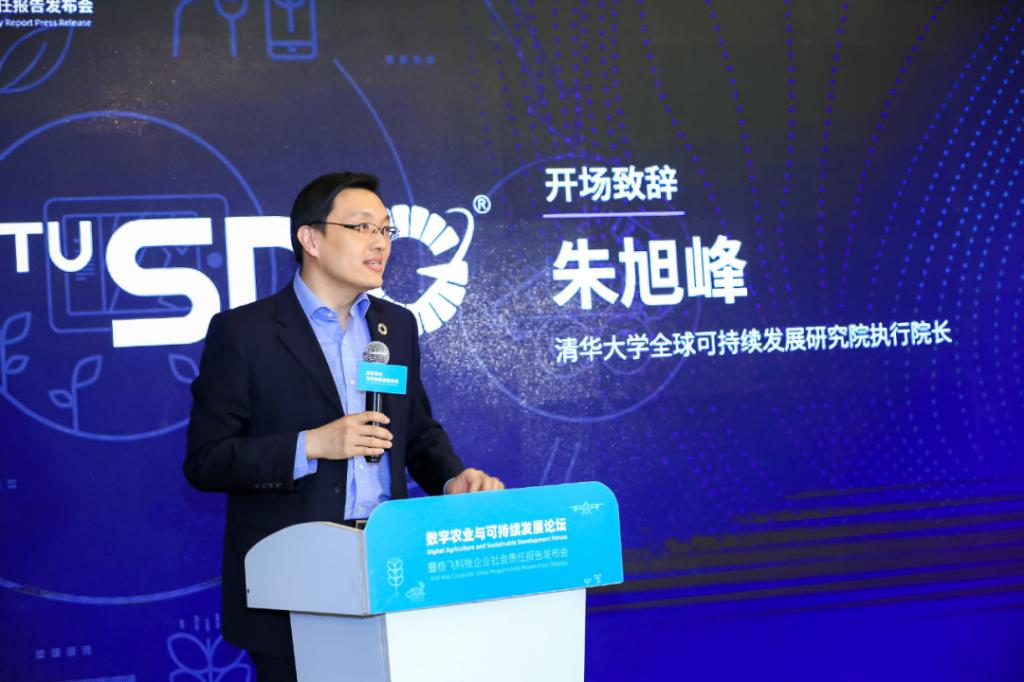
Speech by Prof. Zhu Xufeng, Executive Director of TUSDG
Yu Zhihong expressed how impressed and amazed he was by the application of XAG’s advanced unmanned technology to agricultural production for enhancing agricultural production efficiency, guaranteeing food security and promoting rural revitalization. He believed that the rural revitalization is first to achieve the revitalization of agriculture, and science and technology should be used in agriculture. He pointed out that the development of digital agriculture is of great significance to achieve the SDG1 (poverty eradication), SDG2 (zero hunger), SDG8 (decent work and economic growth), SDG10 (reducing inequality) and SDG13 (climate action).
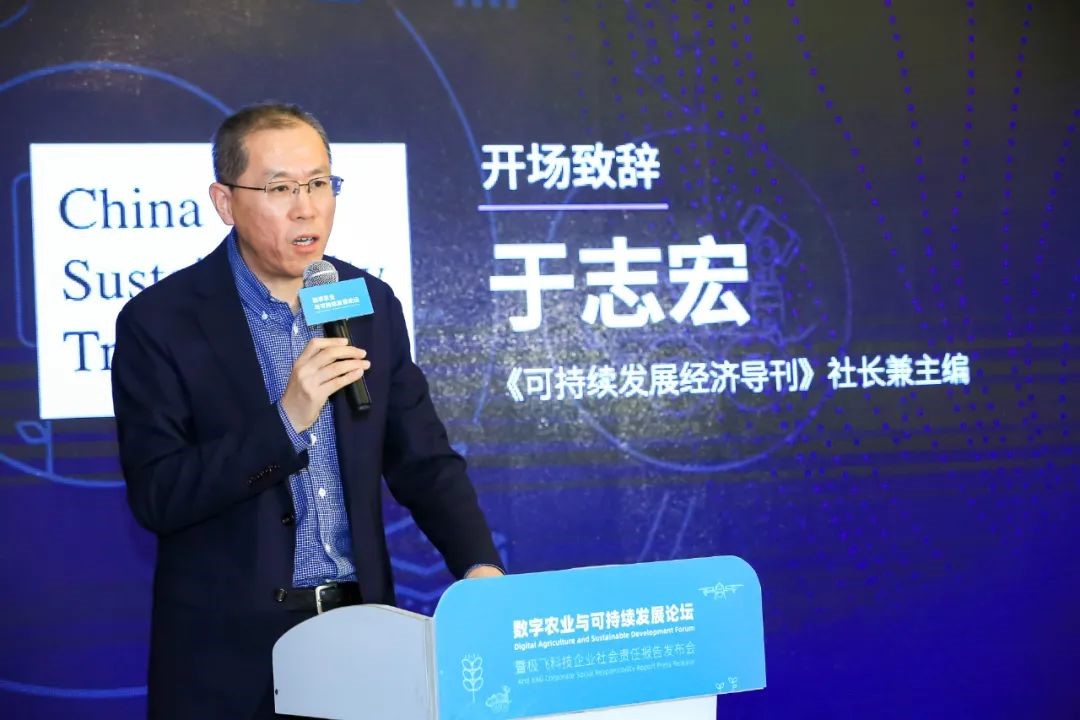
Speech by Yu Zhihong, President and Editor-in-Chief of China Sustainability Tribune
Peng Bin shared the mission of XAG - to change the world, to change the production environment. He believed that the social relationship in agriculture will change in the future, and technology plays crucially role in promoting the sustainable development of agriculture. XAG places agriculture as the application scenario for enterprise to utilize digital technology precisely and takes "improving the efficiency of global agricultural production" as its mission. In promoting digital agriculture, XAG emphasizes the commercial value of its products and also fulfills its corporate social responsibility at the same time. He believed that through artificial intelligence, big data and other digital technologies, China's rural areas can take the lead to the automated driving and unmanned agriculture, and achieve the SDG of "zero hunger", realize the agricultural and rural modernization development, and contribute to the rural revitalization.
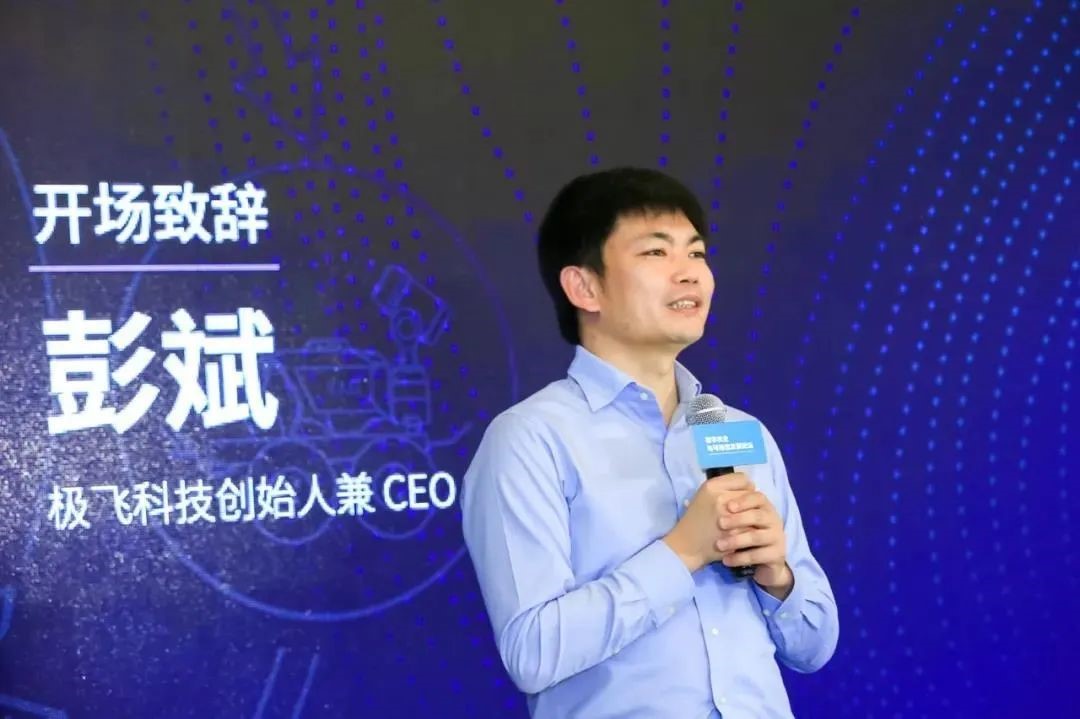
Speech by Peng Bin, Founder and CEO of XAG
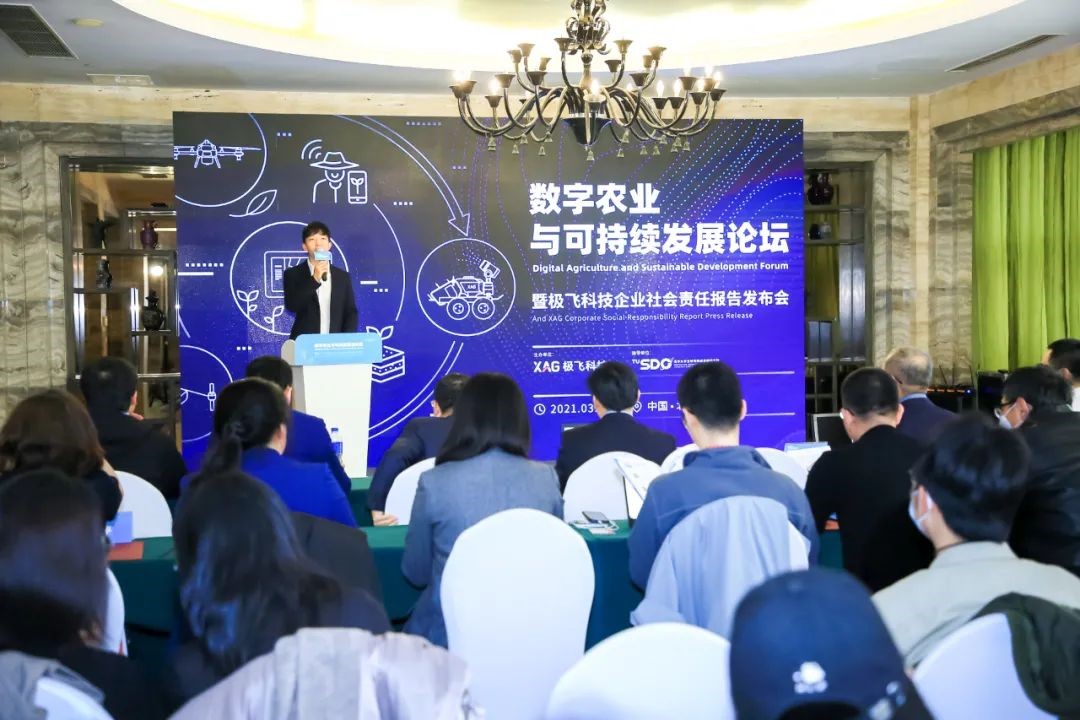
Tong Wei, Head of Public Relations and Global Affairs of XAG, hosted the speech session.
Report Release
Gong Jiaqin, co-founder of XAG, released the XAG Corporate Social Responsibility Report and gave a detailed introduction of the report. He focused on the current dilemmas facing China's agricultural and rural development and believed that rural areas are facing major challenges such as population loss, cultural loss, and lack of industry. Insufficient supply chain and deep processing capabilities, and low value-added agricultural products make rural areas less competitive in attracting investment and less attractive to young people. To tackle these problems, digital agriculture provides an effective solution. By building digital agriculture infrastructure, developing precise agricultural intelligent equipment, and creating intelligent farm production operating system, XAG attracted more and more young people to return to the countryside, and collaborated the local government to cultivate future agricultural elites. For XAG, developing and applying digital technology to agricultural industry is not only the main business of building its commercial value but also presenting them fulfilling corporate social responsibility.
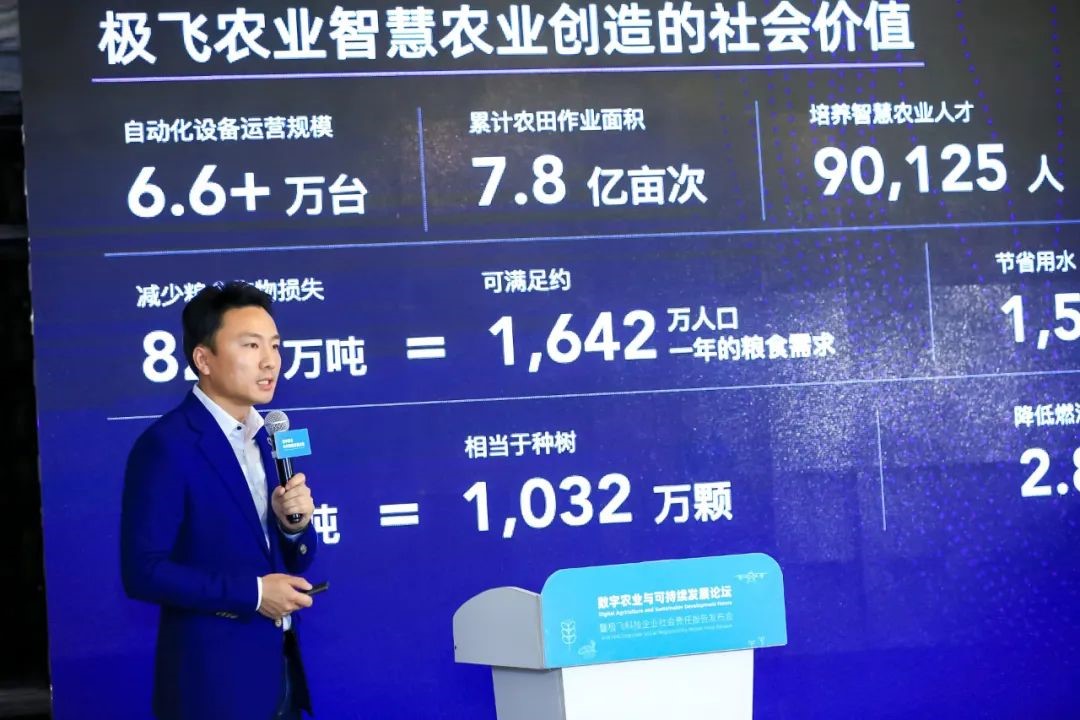
Gong Jiaqin, Co-founder of XAG, Introduces the Report in Details.
Summit Dialogue
Later on, Gong Jianqin, Co-Founder of XAG, opened a dialogue with Li Kaifu, Chairman and CEO of Sinovation Ventures, and Prof. He Fan, Professor of Antai College of Economics and Management of Shanghai Jiao Tong University, to discuss how to practically implement the "AI New Economy", empower the traditional industries, and the changes and challenges of the agriculture, rural areas, and farmers facing in the recent years. Taking a looking at impact of digital technology progress on the future of society, Li Kaifu proposed a perspective of "rural areas is the best place for AI implementation", he believed that artificial intelligence and drone technology, the Internet of Things and even synthetic biotechnology and other digital technologies will replace a large number of repetitive labors, people can have more time and energy to engage in the work required creativity or strategic analytical thinking.
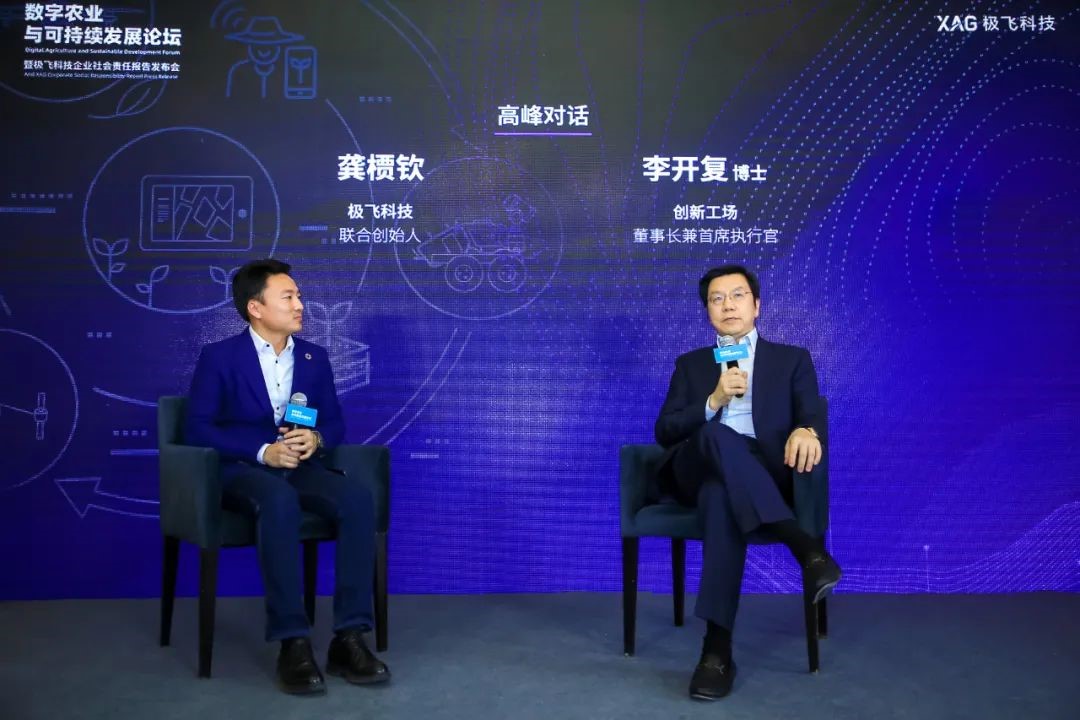
Summit Dialogue: Li Kaifu, Chairman and CEO of Sinovation Venture
He Fan shared his perspectives on digital agriculture and sustainable development with a focus on enterprise innovation and transformation of the agricultural industry. He said that rural area is the root of China and agriculture is the traditional industry in China. But now, the vast rural areas tend to be marginalized, the agricultural industry is facing the challenge of transformation and upgrading, and the identity of farmers is becoming more and more ambiguous. He believed that with the help and promotion of digital technology, rural areas will become an important place for innovation in the future. The emergence of new occupations in the agricultural field and the inclination of enterprise investment to rural areas will bring new opportunities to the sustainable development of agriculture and rural areas.
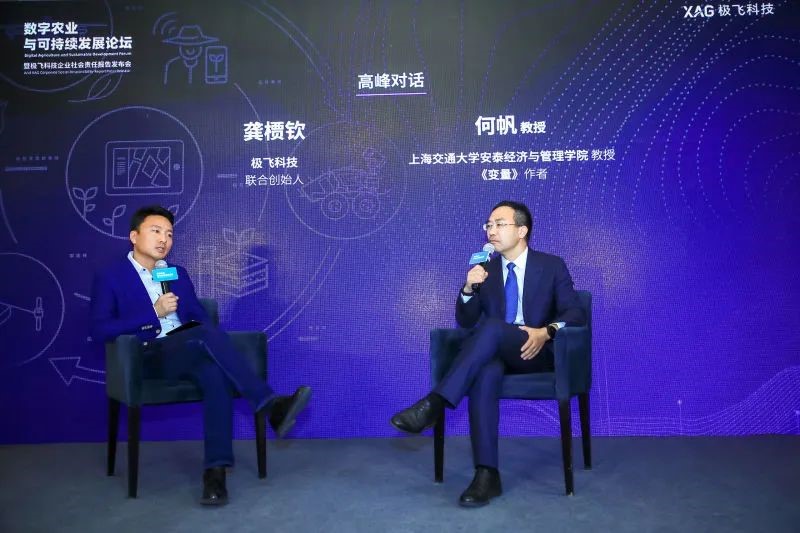
Summit Dialogue: He Fan, Professor of Antai College of Economics and Management of Shanghai Jiao Tong University
Expert Roundtable
Dong Le, Poverty Reduction and Innovation Officer of FAO, Peng Bin, Founder and CEO of XAG, Chen Fu, Partnerships Consultant of the United Nations World Food Programme (WFP), and Wu Qiong, Senior Program Officer (Beijing Office) of the World Wide Fund for Nature (WWF), took part in the expert roundtable session, which was moderated by Prof. Zhu Xufeng. Prof. Zhu based on the different expertise of the guests to conduct in-depth discussion with enterprises and international organizations.
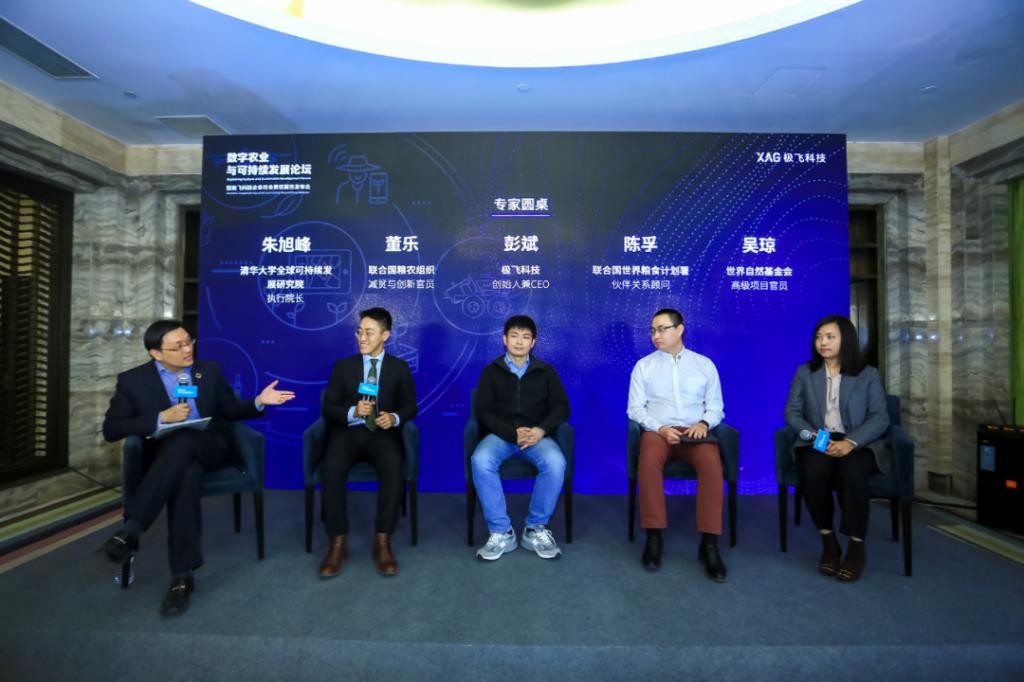
Expert Roundtable
Peng Bin shared the challenges and difficulties encountered in the process of digital agriculture promotion by XAG. He believed that the key to tackling the challenges is not to breakthrough the original technology, but reshape the solutions of the agricultural problems. He introduced typical cases in which XAG promoted intelligent products such as agricultural drones and unmanned vehicles in different regions of China, and applied them to various aspects of agricultural production, as well as shared XAG's experience in expanding overseas markets.
Dong Le and Chen Fu, as representatives of the United Nations agencies, contributed their insights on digital agriculture helping rural revitalization and solving SDG2 (Zero Hunger) issues with the perspective of international organizations. According to Dong Le, the promotion of digital agriculture technology has played a positive role in easing the pressure on female labor in rural areas and helping people with disabilities solve the employment problem. Under the guidance of China's "14th Five-Year Plan", digital agriculture has great potential for future development. Chen Fu believed that the most prominent feature of digital agriculture is that it can precisely solve the problem of sustainable development, especially in improving the efficiency of agricultural production, increasing food production, guaranteeing food security and other issues with remarkable results.
Wu Qiong stated that agricultural production is closely related to biodiversity, climate change and other environmental issues. She believed that digital technology has obvious advantages in optimizing irrigation modes, reducing the use of pesticides, and improving agricultural yields, and etc. The development of digital agriculture has played a positive role in protecting biodiversity, maintaining ecological balance, and coping with the adverse effects of climate change on food production. She also pointed out that the application of digital agriculture technology needs to be differentiated according to the characteristics of the ecological environment in different regions. A comprehensive and systematic assessment of the local ecological environment should be carried out before the use of new technologies.
At the end of the roundtable discussion, Prof. Zhu invited the four experts to share the future challenges and opportunities facing the sustainable development of digital agriculture in the post epidemic era. The experts believed that AI will greatly change the traditional agricultural production modes in the next decade, but also needs to pay attention to the impact of unfavorable factors, such as digital divide, data discrimination, and information overload, during the process of promoting and applying digital agriculture.
Prof. Zhu concluded that the rise and development of digital agriculture will have a great impact on the industries, societies, countries and even the whole world. While developing AI technology, XAG is dedicated to devoting itself to the world, focusing on the upgrading and transformation of China's industry, the trade of agricultural products and industrial restructuring between different countries, and also the SDGs realization. In the post pandemic era, the development of digital agriculture requires more standardized public policies and management systems, also needs to avoid the negative impacts of the digital divide, data use ethics and other issues.
This year, TUSDG has collaborated with the World Resources Institute (WRI) on the topic of "Sustainable Transformation of China's Agriculture, Food and Land Use", which focuses on sustainable development in the agricultural sector, and has been invited to join the Food and Land Use Coalition, with a special focus on artificial intelligence for achieving the SDGs. At the same time, we have also paid special attention to research on artificial intelligence for the realization of the SDGs. The forum successfully provided a good opportunity for people from all walks of life who attach importance to digital agriculture and sustainable development to exchanges and cooperation, and also contributed valuable views for digital technology to promote sustainable agriculture development and rural revitalization.
